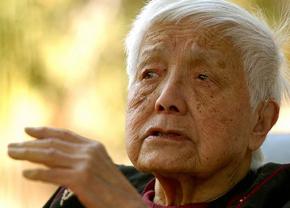Changing the world from below
honors an important socialist activist, in an article written for Jacobin.
GRACE LEE Boggs died earlier this month at the age of 100. Her life was a monument to some of the most powerful social movements of the 20th century. Over the course of her life, Boggs was a leader in the socialist, civil rights, Black Power, feminist and environmental movements.
Boggs was no stranger to debate, conflict or controversy, and her viewpoints were polarizing, even on the left. Throughout her long political career, she was often at the center of political struggles that redefined the contours of parties and social movements.
Those same debates often led Boggs to new insights and conclusions. But while her ideas and perspectives developed and changed significantly over the course of her life, Boggs was consistently informed by an irrepressible belief that people need not accept "all the old shit," to borrow young Karl Marx's expression.
As a close comrade of C.L.R. James and Raya Dunayevskaya, Boggs dedicated herself early on in her political life to the independent struggle for socialism. She was part of a small tradition within the Trotskyist movement that stressed the self-activity of workers and the oppressed, and believed that emancipation must come "from below," outside the realm of Moscow and Washington's imperial ambitions.

"The struggle for socialism is the struggle for proletarian democracy," Boggs and her comrades argued in their manifesto, The Invading Socialist Society. "Proletarian democracy is not the crown of socialism. It is its basis. Proletarian democracy is not the result of socialism. Socialism is the result of proletarian democracy."
Alongside James, Dunyavskaya and others, Boggs argued forcefully with other socialists that the independent struggle for Black liberation was an indispensable component of the fight for "proletarian democracy." Revolutionaries, Boggs explained in her memoir Living for Change, "should trust that the momentum of the struggle will bring out the hatred of bourgeois society that is latent in the Black experience."
Boggs extended this perspective through the rest of her political life, long after she split from the Trotskyist movement. With her husband, Boggs became deeply implanted in the struggle for Black liberation, from the labor movement in Detroit's auto plants through to the civil rights and Black Power movements and beyond. Boggs and her comrades praised the 1967 Great Rebellion in Detroit, seeing it as a blow against the segregation and impoverishment of the city's Black workers.
FOLLOWING THE defeats of the civil rights and Black Power movements, Boggs increasingly believed that a radical shift in people's values and consciousness was a necessary precondition to any successful revolutionary movement. Indeed, if there was any weakness in Boggs' vision, it was her belief that people's consciousness could transform itself, independent of mass collective action such as protests or strikes.
In her final book, The Next American Revolution: Sustainable Activism for the Twenty-First Century, co-authored with Scott Kurashige, Boggs argued, for instance:
[I]t becomes clearer every day that organizing or joining massive protests and demanding new policies fail to sufficiently address the crisis we face. They may demonstrate that we are on the right side politically, but they are not transformative enough. They do not change the cultural images or the symbols that play such a pivotal role in molding us into who we are.
Instead, Boggs argued for "visionary" organizing and emphasized the role that community-based projects such as urban gardens could play in "re-civilizing our society."
Boggs' perspective that activists should "go beyond protest organizing" had the unfortunate occasional effect of leading her toward familiar neoliberal rhetoric or policy. In an article for the National Public Radio show On Being, for instance, she discouraged activist demands for job programs, and in 2013, the Boggs Educational Center opened in Detroit as a charter school.
While Boggs could be a polarizing figure on the left, she nevertheless dedicated her life to the belief that ordinary people could change the world, and was not--as the New York Times or President Obama would have it--a mere "human rights advocate." Boggs helped shape the great struggles of the 20th century, which we continue to build upon today as we fight for a world free of exploitation, oppression, war and environmental destruction.
A vision of such a world can be hard to hold on to in a world that ceaselessly screams that there is no alternative. Yet Boggs's hope that such a world is not only possible, but also urgently needed, never faltered despite the defeats and counter-revolutions she witnessed in her lifetime.
This is Boggs's legacy: the tireless belief that humanity is capable of rising above the barriers of capitalist competition and exploitation, and that we can radically transform ourselves and the world.
First published at Jacobin.


